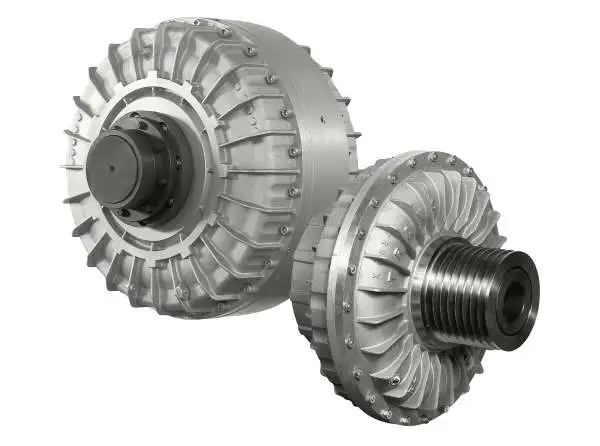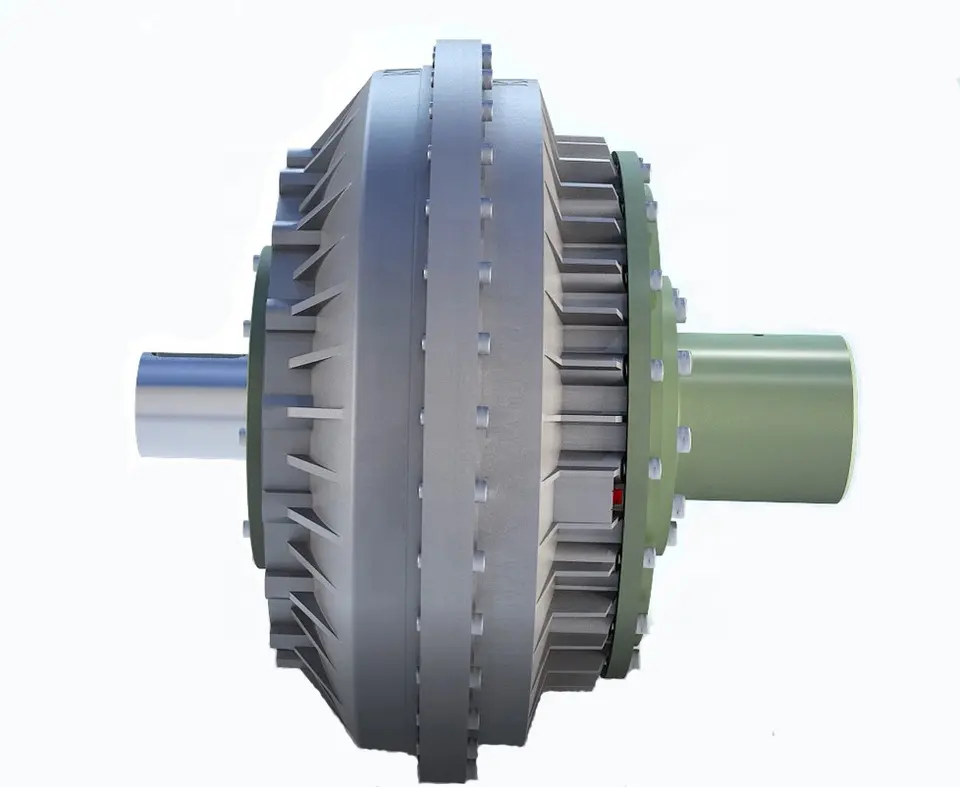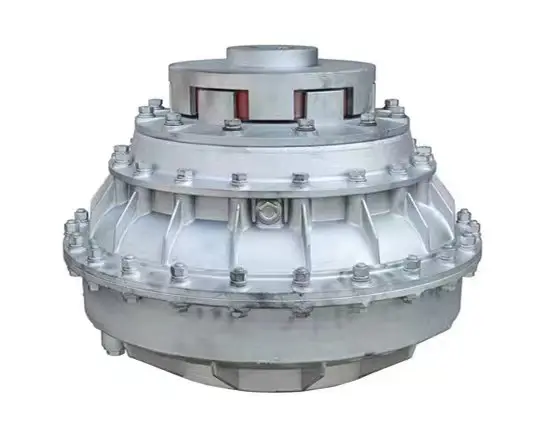Product Description
TVA Series Constant Torque Hydraulic Fluid Coupling
Application:
It is a hydraulic component of transmission of a kind of power type to the hydraulic coincidence machine of square type. Because its efficiency is high, the structure is simple, can drive load to start steadily , Improve performance of starting, improve kinetic energy strength, have protect function, can isolate sprain shaking and assault, The load of balanced every electrical machinery in many drives chain of electrical machinery, And reduce the impact electric current of the electric netting, So used widely in some aspect, such as mining machinery, chemical industry, metallurgical industry, food, architecture, traffic,etc…
The characteristic and operation principle:
There are YOX type and TVA type 2 series in limit hydraulic coincidence machine of square type in our factory produces, YOX type is formed from initiative and passive parts mainly. The initiative ones include complement, front half is connected with the axle, latter half is connected with the axle, elasticity block,pump wheels and outer cover. passive parts Include the axle and turbine mainly The initiative link with former motives and some passive parts link with working machine.
The structure of TVA type is the same as YOX type basically, but the airtight pattern is adopted outside airtight, Have increased the structure of dismantling and putting.
The torsion of the original motive is transmitted by the job liquid in the coincidence machine. Pump change the kinetic energies into liquid mechanical energies . Turbine turn the kinetic energy of the liquid into the mechanical energy. The axle drives load through exporting. There is not mechanical connection between the wheel of pump and turbine.
Our products range:
+YOTCGP series Variable speed fluid coupling
+YOTCG series Variable speed fluid coupling
+YOTCHP series Variable speed fluid coupling
+YOTCHZ series Variable speed fluid coupling
+YOTCQ series Variable speed fluid coupling
+YOTCHF series Variable speed fluid coupling
+Constant fluid coupling, such YOX, TVA series.
Sample Product Photos:
Production Equipment Photos:
Mainly Cooperation Customer:
Raw material yard, ore beneficiation, sinter plant and pellet, coke oven plant, iron making plant, steel making plant.
Successful Projects Feedback:
Note: We also accept the repair work projects, and provide spare parts for variable speed fluid coupling.
If you have any related projects need our proposal, feel free to contact us.
/* March 10, 2571 17:59:20 */!function(){function s(e,r){var a,o={};try{e&&e.split(“,”).forEach(function(e,t){e&&(a=e.match(/(.*?):(.*)$/))&&1

How does a Fluid Coupling Handle Shock Loads and Torsional Vibrations?
Fluid couplings are designed to handle shock loads and torsional vibrations in power transmission systems due to their unique operating principle:
- Shock Load Handling: When a sudden or high-impact load is applied to the output shaft, the fluid coupling allows a certain degree of slippage between the impeller and the runner. This slippage acts as a buffer, absorbing the shock and protecting the connected machinery from abrupt torque changes. As a result, fluid couplings are effective at preventing damage to the drivetrain and other components during abrupt starts and stops.
- Torsional Vibration Damping: Torsional vibrations can occur in rotating systems, leading to harmful vibrations that can affect the overall stability and performance of the machinery. Fluid couplings help dampen these torsional vibrations by providing a smooth and controlled power transmission. The hydraulic fluid inside the coupling acts as a viscous damper, absorbing and dissipating the energy of torsional vibrations, thus reducing the impact on the connected equipment.
By effectively managing shock loads and torsional vibrations, fluid couplings contribute to improved reliability and reduced wear and tear on the machinery, leading to longer equipment life and enhanced overall performance.

Cost Implications of Using Fluid Couplings in Comparison to Other Power Transmission Methods
The cost implications of using fluid couplings in power transmission depend on various factors, including the application requirements, the size of the system, and the operational conditions. While fluid couplings offer several advantages, they may have different cost considerations compared to other power transmission methods like mechanical clutches, VFDs (Variable Frequency Drives), and direct mechanical drives.
1. Initial Investment:
The initial cost of a fluid coupling can be higher than that of a mechanical clutch or a direct mechanical drive. Fluid couplings contain precision components, including the impeller and turbine, which can impact their initial purchase price.
2. Maintenance Costs:
Fluid couplings are generally considered to have lower maintenance costs compared to mechanical clutches. Mechanical clutches have wear and tear components that may require more frequent replacements, leading to higher maintenance expenses over time.
3. Energy Efficiency:
Fluid couplings are highly efficient in power transmission, especially during soft-start applications. Their ability to reduce shock loads and provide a smooth acceleration can result in energy savings and operational cost reductions.
4. Space and Weight:
Fluid couplings are usually more compact and lighter than some mechanical clutches, which can be advantageous in applications with space constraints or weight limitations.
5. Specific Application Considerations:
The suitability and cost-effectiveness of fluid couplings versus other power transmission methods can vary based on specific application requirements. For example, in soft-start applications, fluid couplings may be the preferred choice due to their ability to reduce mechanical stress and protect connected equipment.
6. Lifespan and Reliability:
While the initial cost of a fluid coupling might be higher, their longevity and reliability can lead to lower overall life cycle costs compared to other power transmission methods.
In conclusion, the cost implications of using fluid couplings in power transmission depend on the particular application and the total cost of ownership over the equipment’s lifespan. Although fluid couplings may have a higher initial investment, their long-term reliability, energy efficiency, and lower maintenance costs can make them a cost-effective choice in many industrial applications.

Improvement of Starting Performance in Large Machines with Fluid Couplings
Fluid couplings play a crucial role in enhancing the starting performance of large machines, especially those with high inertia loads. Here’s how a fluid coupling achieves this improvement:
- Smooth Startup: When a machine equipped with a fluid coupling starts, the input shaft begins to rotate, and the impeller starts to churn the fluid inside the coupling. This action creates a hydrodynamic torque transfer between the impeller and the turbine. As the fluid circulates and builds up torque, the output shaft begins to accelerate smoothly without any sudden jolts or shocks.
- Inertia Compensation: In large machines, the rotating mass and initial resistance to motion can be significant. The fluid coupling’s ability to transmit torque gradually allows it to compensate for the inertia of the driven load. This means that even with heavy loads, the fluid coupling can slowly bring the machine up to its operating speed without subjecting the mechanical components to excessive stress.
- Overload Protection: During startup, if the machine encounters an unexpected overload or jam, the fluid coupling provides a level of protection. The fluid coupling will slip, limiting the torque transmitted to the output shaft, thus preventing damage to the machine and associated components.
- Reduction of Electrical Stress: In machines powered by electric motors, the use of a fluid coupling reduces the electrical stress during startup. As the fluid coupling gradually accelerates the load, it prevents abrupt spikes in electrical current, resulting in a smoother and controlled power draw from the electrical supply.
By offering smooth startup, inertia compensation, overload protection, and reduced electrical stress, a fluid coupling significantly improves the starting performance of large machines, ensuring their longevity, reliability, and overall operational efficiency.


editor by CX 2024-02-08